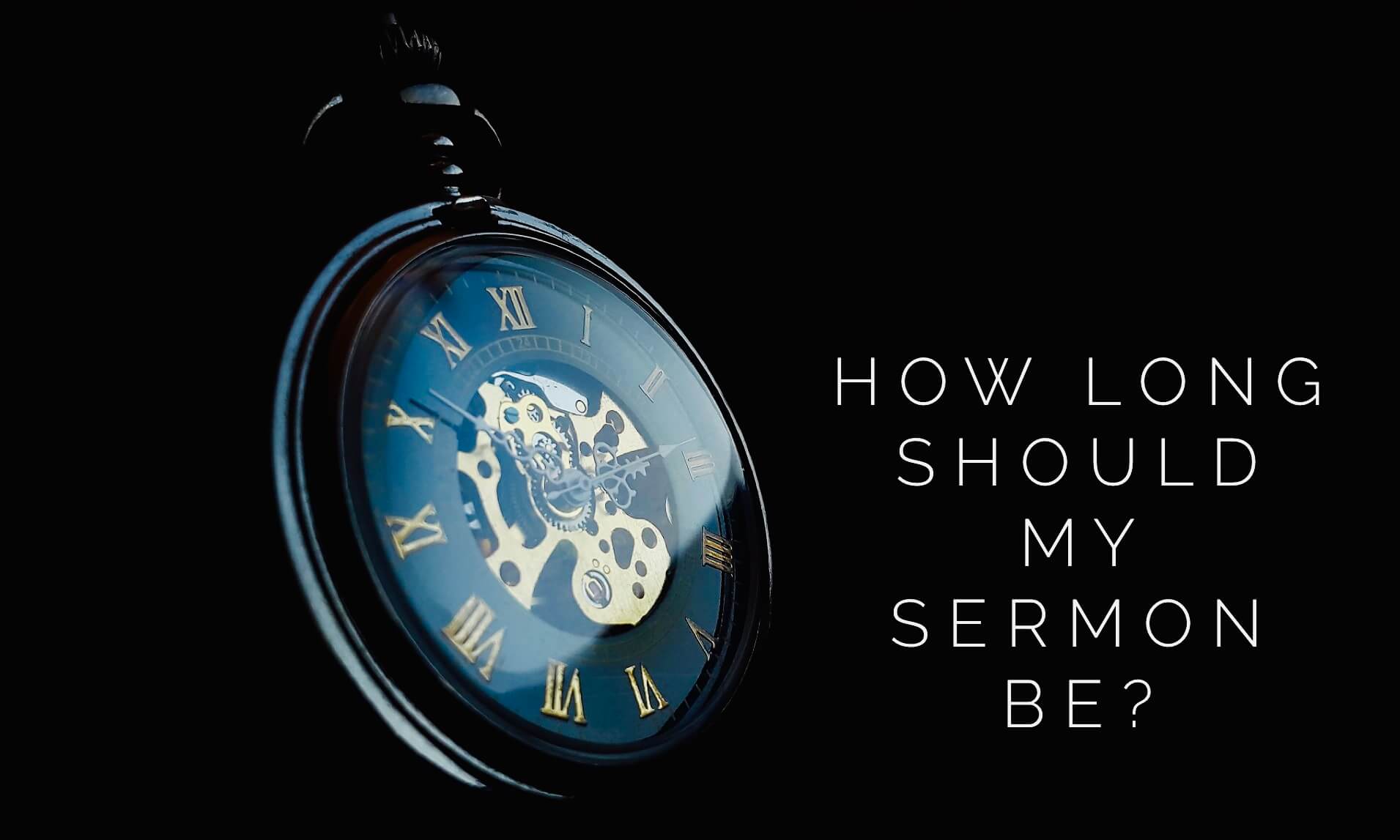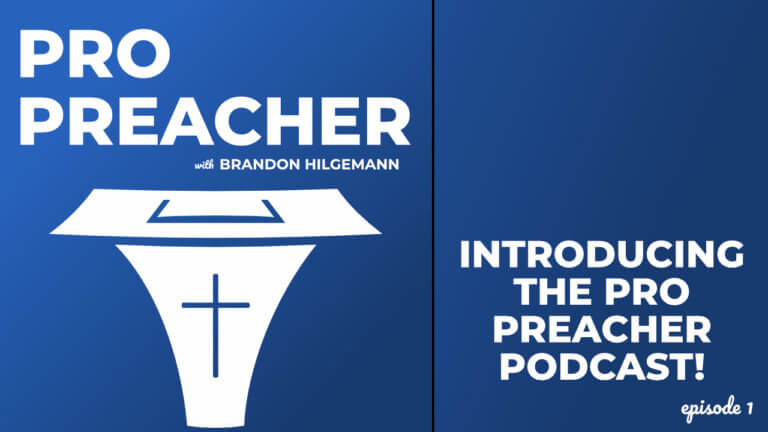How Long Should My Sermon Be?
I’m a fairly new Pastor. I’ve been pastoring a small Church in upper state New York for just over two years. My preaching style has morphed over the years. My sermon preparation, notes, and delivery have transformed into completely different forms.
I’ve read books on preaching, listened to good preaching, inevitably compared myself to other preachers, and yet the number one game-changing aspect to my preaching preparation and delivery has been the Word of God.
When I read good books on preaching, I found them helpful and interesting, but nothing compared to the Word of God.
When I listened to other pastor’s sermons, I found them helpful and entertaining but usually found myself overcome by the insurmountable temptation of comparison.
One day, I sat face to face with a gentleman from my congregation who told me that my sermons were too long, or at least, I didn’t end at 12 o’clock noon. As a rookie pastor, my sermons would extend anywhere from 40-60 minutes. Keep in mind that my congregation runs an average age of 60, which means their attention span should be a bit longer.
However, I did come face to face with an audience that looked distracted and finicky towards the end of my sermons. I felt conflicted because there seem to be two prevailing opinions on the length of sermons among ministers: shorter is better or longer is holier.
I didn’t adopt either of those views but needed clarification on how long is too long and how short is too short. I needed to find my position.
The Answer in Hebrews
It all clicked one day as I was studying through Hebrews 11. Towards the end of the faith chapter, the author says, “and what more shall I say? For time would fail me to tell of Gideon, Barak, Samson…” (Hebrews 11:32). That statement struck me for several reasons.
First, it’s unknown who wrote the book of Hebrews. For that reason, I like to give simple credibility to the Holy Spirit who inspired all of Scriptures literature, regardless of what person wrote it (2 Peter 1:20-21).
Second, because the Holy Spirit is ultimately the source of Hebrews, and Hebrews is written very much like a sermon, then Hebrews 11:32 is apart of a Holy Spirit Sermon!
For that reason, I realized that the best instruction on learning how to develop a sermon comes by studying the Scriptures, observing their outlines, listening to the words, focusing on the different styles of authorship and length, and then asking God how He would like His Spirit to preach through you.
It’s no coincidence that God’s Word is filled with 66 individual books with varying degrees of length, style, and topics. What makes them all different? The people make them different, but what makes them all similar? The Spirit unites them together.
Therefore, if I was to preach a Spirit-filled sermon along with other Spirit inspired sermons, I reckoned that it would sound very different than the myriads of other stellar sermons, mainly because I’m a different personality with a different God-made mind.
Isaiah doesn’t write like Amos, and Peter doesn’t write like Paul. Isaiah uses some rich language and lengthy discourses while Amos writes a smaller book with farmer language. The Apostle Peter writes with fisherman schooled language whereas the Apostle Paul writes as one trained under the mighty academically acclaimed Gamaliel.
Here’s the point: The Spirit of God uses every different author of the Bible to write out their messages uniquely according to their personality and background.
Therefore, it’s true that some Christians who read Roman’s will scratch their head and wonder what it all really means because it’s too deep for simple thinking and too long for their short attention span. But the same people who have difficulty following Romans will love a book like Proverbs because every statement comes in bite-size portions with a scatter-brained feel. However, the real intellectual might love Romans or Hebrews because of some of the deep thoughts.
It’s also true that the Preacher can’t please everybody with his messages. Some will think that it’s over their heads, and others will think that it was too long. Perhaps others will feel as if you were too simple or shallow.
That’s okay though, because God wants to use a pastor’s personality to preach.
That is to say that the Spirit will use every preacher very very differently within their types of sermon deliveries. Some will be simple, some might be more deep. Some will be longer and others will be shorter. There is not necessarily a right or wrong length to a sermon.
However, the one aspect that makes one’s sermon length right is time sensitivity.
Time Sensitivity
When the Author of Hebrews (the Holy Spirit ultimately) says, “and what more shall I say?” it’s like getting a glimpse into the sermon speakers mind. That phrase “what more shall I say” doesn’t need to be told to the audience. Rather, it’s the writer choosing to speak out loud.
It doesn’t contribute to the argument or topic of the book. It’s more of a side comment that a speaker might say at the beginning of his Sermon like, “Oh wow, I’m nervous.”
But in a rare instance, we get a glimpse into the Spirit’s mind of writing and preaching. The Spirit of God thinks “what more shall I say?” In other words, He has a lot more to say since the next lines are filled with a summary of a dozen other faith-biographies.
The Spirit has more to tell that He’s just dying to write but doesn’t have time to say it.
He says, “but time would fail me.” Now that is an incredible statement! The all sovereign Spirit of God who lives outside of time is time sensitive. I like to think that if the immortal Spirit of God was sensitive to His readers time, then so should every mortal preacher.
To answer the question, “how long should a sermon be?” Honestly, I don’t think that there is a right or wrong answer to that question.
God’s Spirit-filled different individuals of the Bible to write different varying lengths of sermon style Scriptures. Thus, every preacher needs to be wise and discerning by knowing their audience, their service, traditions, nature of the event, etc…and then act accordingly.
However, whenever somebody tells you that your sermon was too long, listen intently and consider that they might be right. Certainly, you had more to say, but the time failed you.
We are God’s creatures who live in time. Instead of trying to fight against it, we should rather aim to work with it.
Time can be a preacher’s worst enemy or best friend depending on how they look at it. It’s their worst enemy if they insist on saying everything that they want to say. It’s their best friend if they consider it like a form of measurement to their performance, a coach if you will, who helps them train.
Every running athlete invites the clock into their performance. Without it, their work would count for nothing and success would be unmeasured.
Every preacher can adopt the same outlook. To preach a shorter message is typically harder than preaching a longer message. Thus, consider it a challenge. It will test your work and your words. Sometimes, shorter can be better because “time would fail me.”
Aaron Spoonhour pastors the First Baptist Church in the Adirondack mountains of New York. He is the husband of a beautiful wife and the father of a wonderful son. Besides ministry and family, Aaron loves hiking, biking, running, and hunting.
If you would like to write a guest post too, go here.




